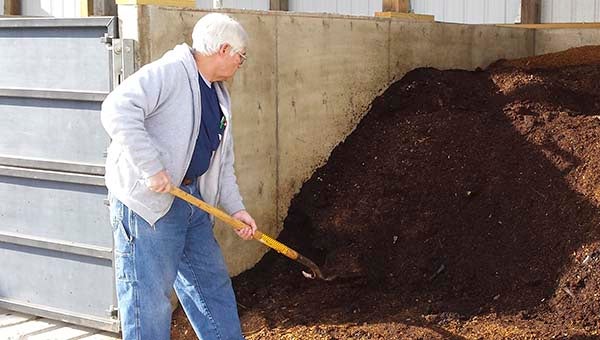Animal composting underway in Hampton Roads
Published 10:23 am Wednesday, January 7, 2015

Ron Kersey shovels the compost/sawdust mix on top of carcasses to start the decomposition process. — COURTESY | VDOT
By Laurie Simmons
Special to The Tidewater News
WINDSOR
Workers in the Virginia Department of Transportation’s (VDOT) Hampton Roads District remove an average of 20 dead animals every week from state-maintained highways. District employees now have a new tool to dispose of roadkill in an environmentally friendly and cost-efficient way.
This deer season, workers at VDOT’s Windsor Area Headquarters are using new micro-aeration composting facilities, where air is pumped out from PVC pipes at the bottom of a contained compost bin. The air creates a host environment where microbes can thrive, helping to break down animal carcasses into compost in as little as six weeks. The compost then finishes maturing in a curing area for two months.
To get started, workers cover the bottom of the bin with a layer of sawdust and then place the carcasses inside. They are covered with an equal mix of compost material and sawdust. As the carcasses start to decompose, the resulting liquids, called leachate, drain into slots at the bottom of the bin, collecting into an underground septic tank.
Workers recycle the microbe-rich liquids and spray it back onto the compost pile to help speed the decomposition. As more carcasses are added, additional layers of the compost-sawdust mix are placed on top, until the bin is filled.
The air, along with the continuous recycling of the microbe-rich liquid, helps temperatures in the compost pile reach up to 160 degrees. Higher temperatures translate into increased microbial activity, reduced composting time and fewer health hazards. Extra sawdust is always available to prevent unwanted odors. When the process is complete, the fresh compost is ready to be recycled and used at VDOT facilities and along Virginia roadways.
The Windsor Area Headquarters is one of four pilot test sites to start composting operations around Virginia. VDOT and its research division, the Virginia Center for Transportation Innovation and Research (VCTIR), have studied the performance of these types of facilities and other composting methods for several years to provide additional effective carcass-management options that comply with environmental regulations. Composting also can help reduce some of the costs associated with transporting roadkill to offsite disposal sites.
Laurie Simmons, senior public affairs specialist for VDOT, said there were two research test sites at Bethel in Halifax County, and another in the Salem District. In addition to Windsor, Richmond is another operating pilot site. Others will be in New Kent County, Salem District and Lynchburg District, and VDOT is researching additional locations.
Two people at each area headquarters are trained to maintain the compost bins, but only one person is needed for operations at any given time, Simmons said
She also said that each of the pilot sites costs $140,000 to be fully operational. As for savings, Simmons referred to the 2010 study, which “had found that 46 of the 189 VDOT area headquarters frequently used landfills and traveled away from routine maintenance routes to dispose of deer carcasses. In that study, researchers estimated that if those 46 VDOT area headquarters switched to using windrow composting in their maintenance areas or along routine maintenance routes, VDOT could save approximately $515,440 in labor costs and landfill fees annually. With fewer trips to disposal facilities, VDOT also would save substantially on fuel and reduce carbon emissions.”
LAURIE SIMMONS is a senior public affairs specialist for VDOT. She can be contacted at 925-1647 or laurie.simmons@VDOT.virginia.gov.
STEPHEN H. COWLES, a staff writer for The Tidewater News, contributed to this article. He can be contacted at 562-3187 or stephen.cowles@tidewaternews.com





